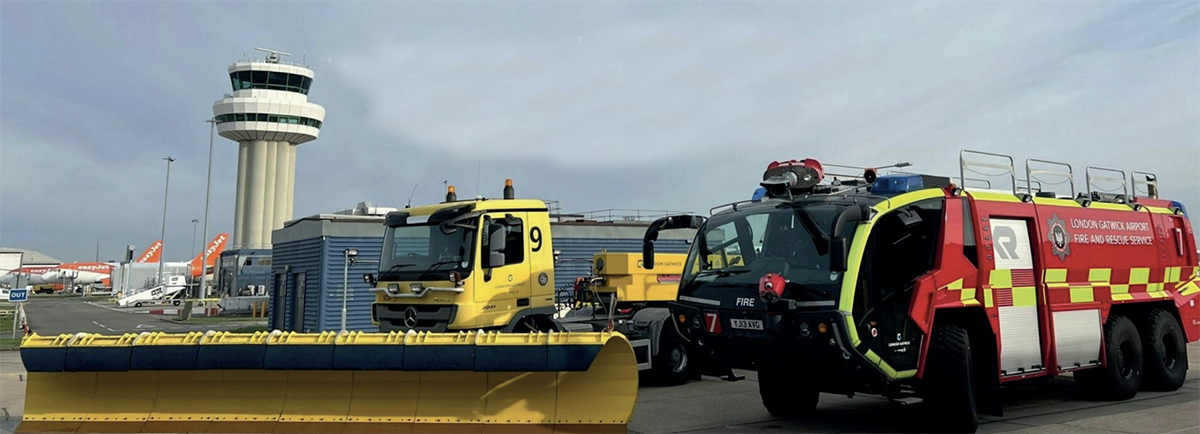
London Gatwick has cut carbon emissions from its fleet by 90% by transitioning from diesel to hydrotreated vegetable oil (HVO), saving 950 tonnes of carbon emissions a year.
All of Gatwick’s 300 diesel vehicles, 85% of the airport’s fleet, are now powered by HVO until they reach their operational end of life. They will then be replaced by electric vehicles as part of the airport’s sustainability policy, known as the Decade of Change.
HVO is a low-carbon biofuel made from plant waste, oils and fats making it a more sustainable and lower-carbon alternative to diesel. The vehicles that are now powered by HVO include all the airport’s fire engines, airside operations vehicles and snow ploughs used to clear the runway. An extensive trial confirmed HVO had no impact on vehicle performance, ensuring airport fire engines, for example, can continue to respond to emergencies across the airfield within three minutes.
Steve Kelso, Head of Engineering, London Gatwick, said: “The implementation of hydrotreated vegetable oil to power our 300 diesel vehicles is an exciting milestone for London Gatwick’s sustainability journey and a big step in our fleet transition.
“From the buses that pick passengers up from the long-stay car parks, to operations vehicles that patrol the airfield, HVO is now being used to fuel vehicles throughout the airport. As we continue to grow, we are making sustainability part of everything we do here at London Gatwick, and we are committed to finding solutions and working differently to meet our ambitious targets.”
Last year, London Gatwick accelerated its commitment to be net zero for its own Scope 1 and 2 carbon emissions by 2030, 10 years ahead of its previous commitment. To support this goal, the airport will allocate over £250 million to replace all vehicles, gas boilers, and refrigerants with low carbon alternatives. Gatwick will also continue to reduce overall energy use, invest in on-site renewable energy, including solar power, and continue to source 100% renewable electricity.
The move to HVO is part of much wider plans to also address Scope 3 (indirect) emissions, which account for the largest impact at the airport. The UK Government, through its Jet Zero strategy, and the UK industry, through Sustainable Aviation, have a plan for aviation to reach net zero by 2050. London Gatwick is working with airlines and industry partners to tackle Scope 3 emissions. This will be achieved through a range of measures including airspace modernisation and innovations in Sustainable Aviation Fuels (SAF),
electric, hydrogen and hybrid aircraft.
London Gatwick has recently been recognised with Level 4+ ‘Transition’ of the Airport Carbon Accreditation scheme - the only institutionally-endorsed, global carbon management certification programme for airports.
One fantastic year as Co-Chair of the Aviation Council
In a recent LinkedIn blog, Stewart Wingate, CEO of London Gatwick, shared insights on a successful year as Co-Chair of the Aviation Council. Formed in 2023 by Baroness Charlotte Vere, and led by Minister Anthony Browne MP as its newly appointed Chair, the Aviation Council represents a collaborative effort among the Department for Transport (DfT), UK Ministers, officials, and industry professionals who seek to futureproof the UK aviation sector and maintain its status as one of the strongest in the world.
In his article, Stewart said “I passionately believe the UK is an aviation superpower, having spent the last 15 years as Gatwick’s CEO; seeing the best (record passenger numbers in 2019) and the worst (the Covid-19 pandemic) of the sector during that time.
We are nearly back to that trajectory of growth and the decade ahead contains the promise that the UK will be a world-leading aviation sector in all aspects of the term, including sustainability and managing our environmental impacts.”
View the full article here: Reflecting on a fantastic year of the Aviation Council via LinkedIn
A week of events and inspiration for school leavers during National Careers Week
London Gatwick celebrated National Careers Week with a host of events for local students, equipping them with guidance and skills needed for future employment.
National Careers Week is an opportunity to support and engage with students who will shortly be leaving education, at an important stage in the academic year. London Gatwick is a key employer in the local region with more than 25,000 people working together across the airport to deliver a great experience for passengers.
Throughout the week (March 4th-9th), events took place to showcase the breadth of opportunities on offer at Gatwick. A total of 385 students took part in STEM activities from schools across Crawley, Worthing, Burgess Hill and Chessington.
The week started with a technician, joined by an apprentice, who delivered a Speakers for Schools virtual discovery workshop on working in engineering to 200 students at local schools.
Volunteers from across London Gatwick attended Thomas Bennett Community College in Crawley to deliver a mentoring session, as part of the Love Local Jobs Foundation Dare to Dream mentoring scheme. The assembly reached 220 Year 9 students, with 15 students being individually mentored. The sessions focused on themes such as self-awareness, mindset, gratitude, resilience, teamwork, and employment. The programme aims to support the development of essential life skills for young people, preparing them for their future careers.
One of London Gatwick’s senior project managers also made a presentation about sustainability and construction at an EVERFI ‘Ask a Pro’ virtual panel.
London Gatwick will continue to offer support to more students in the region, with the aim to reach a million student engagements by 2030 across various education programmes.
Melanie Wrightson, Stakeholder Engagement Manager, London Gatwick said: “At London Gatwick, we are passionate about nurturing talent and encouraging young people to consider a career in the aviation sector.
“A diverse and skilled pipeline of local talent is critical to a healthy labour market and London Gatwick’s future growth. It has been brilliant to welcome so many students to the airport this week and showcase the breadth of careers Gatwick can offer. Our vision is to be the airport for everyone, whatever your journey and it is key we invest in the workforce for the future as we continue to grow.”





